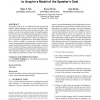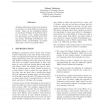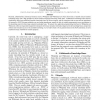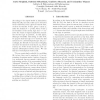227 search results - page 2 / 46 » Acquiring and Representing Semantic Information in a Lexical... |
KCAP
2005
ACM
13 years 10 months ago
2005
ACM
An ultimate goal of AI is to build end-to-end systems that interpret natural language, reason over the resulting logical forms, and perform actions based on that reasoning. This r...
KR
2000
Springer
13 years 8 months ago
2000
Springer
Acquiring information about its environment by sensing is a crucial ability of autonomous robots. Based on the established solution to the Frame Problem of the Fluent Calculus, we...
LREC
2008
13 years 6 months ago
2008
Recently, collaboratively constructed resources such as Wikipedia and Wiktionary have been discovered as valuable lexical semantic knowledge bases with a high potential in diverse...
COLING
2002
13 years 4 months ago
2002
In this paper, a supervised learning system of word sense disambiguation is presented. It is based on conditional maximum entropy models. This system acquires the linguistic knowl...
SIGIR
1993
ACM
13 years 9 months ago
1993
ACM
According to the logical model of Information Retrieval (IR), the task of IR can be described as the extraction, from a given document base, of those documents d that, given a que...




